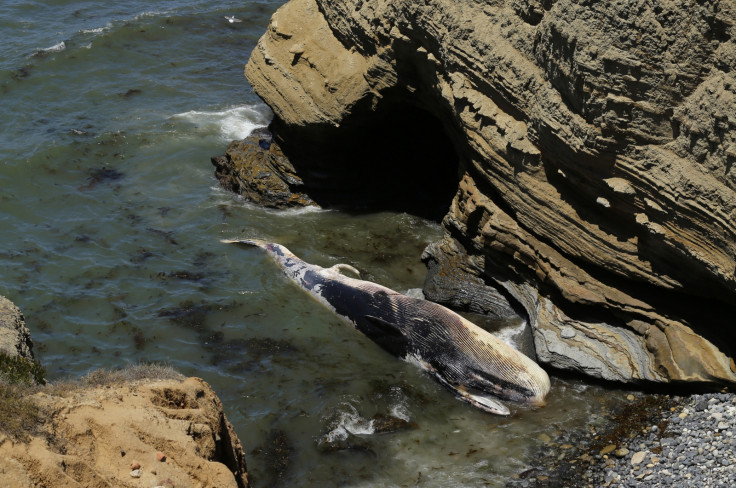30-tonne whale dies after beaching in England, becomes tragic tourist attraction
According to the World Wildlife Fund, fin whales in the North Atlantic are listed as endangered species.

The 30-tonne fin whale that washed up on the shores of Bridlington, England, died as authorities tried to return it to the sea on Tuesday. It took local authorities days to be able to remove the carcass of the massive whale from the beach. They were able to complete the task on Saturday with the help of the police. The authorities claim it was the "largest of its kind" operation.
The police had to intervene to keep crowds away as people had travelled miles to catch a glimpse of the massive creature. Some were even taking selfies with the dead whale.
Zoologists have not yet been able to ascertain the reason behind the beaching. Meanwhile, a team from the Zoological Society of London's Cetacean Strandings Investigation Programme has collected samples to find out the exact cause, per a report in The Guardian.
Beaching, or cetacean stranding, is the phenomenon of aquatic mammals stranding themselves on land, usually on a beach. As many as 2,000 mammals beach themselves accidentally every year. Whales that get beached often die of dehydration, collapse under their own weight, or drown when high tide covers their blowholes.
Not something I ever thought I’d see in Bridlington. A 52ft fin whale stranded on the beach! Unfortunately too large to try refloat & lost its life not long after this. pic.twitter.com/uHsL3DhPLW
— 🐵sockmonkeysteph 🐵 (@StephJS) May 2, 2023
Whales stranded on land dehydrate quickly without the water they are accustomed to. They easily suffocate under their own weight, which is normally supported by the water around them.
Unlike other beached mammals like dolphins, most stranded whales end up dying. Marine experts find it difficult to get the huge mammals back into the water before they die of dehydration or other issues.
According to the World Wildlife Fund, fin whales in the North Atlantic are listed as endangered species. They were hunted by commercial whalers until the last century for oil, meat, and baleen. Climate change, habitat loss, and pollution are some of the factors that are a threat to their survival.
The carcass of a 17m fin whale washed up on a popular tourist beach in East Yorkshire, UK. The 30-ton whale was spotted having difficulties getting back into the sea earlier this week. pic.twitter.com/Hi6dfOHOx6
— People's Daily, China (@PDChina) May 4, 2023
An increasing number of man-made materials and chemicals are polluting the oceans, leading to these aquatic mammals being born with deformities, and their early deaths.
Marine biologists and scientists also speculate that sonars from military boats may be interfering with the whale's brain wave activity, leading them to become disoriented or sick and forcing them to swim towards shallow waters, where they end up beaching themselves.
Changes caused by global warming are also thought to be a reason for the beaching of whales as they go into unfamiliar waters in search of food.
Many whales also wash ashore after death. Recently, an extremely rare 15-foot megamouth shark washed ashore in a village in the Philippines. It was discovered dead by fishermen in the remote area of Gubat in Sorsogon province.
Megamouth sharks, or Megachasma pelagios, come from the Lamniformes order of sharks commonly known as mackerel sharks, which includes the great white shark. They are dark grey-brown on top and light grey to white below.
While they mainly live deep in the ocean, they come to the surface to feed at night. Megamouths have been caught off the coasts of Senegal, South Africa, Brazil, Indonesia, the Philippines, Thailand, and California.
Similarly, a rare white whale washed ashore on a beach in Australia in July last year. Initially, there were concerns that the whale was the well-known albino humpback Migaloo, but the state's environment department has now clarified that it was not Migaloo.
The Department of Environment, Land, Water, and Planning (DEWLP) later examined the images and videos of the dead whale and found that it was a sub-adult female, while Migaloo was a male.
Migaloo has not been spotted off the coast of Australia for the last two years. It is the only known all-white humpback whale in the world. The experts believe that the dead whale that washed up on the beach could have been a whale that lost its colour after dying, not a white whale.
© Copyright IBTimes 2025. All rights reserved.






















